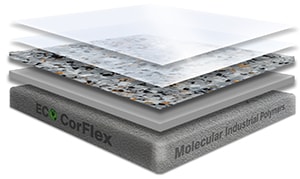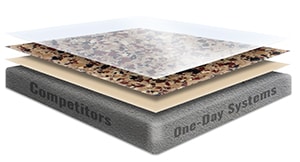WE’RE FIGHTING BACK: THE TRUTH ABOUT “1-DAY” CONCRETE COATING SYSTEMS
In August 2020, GarageFloorCoating.com penned an article shedding light on the dangers of “1-day” coating systems (Polyurea-Polyaspartic One-Day Systems: Do They Work). These systems, known as Polyurea-Polyaspartic One-Day Systems, have gained immense popularity in the realm of garage floor coatings. Contractors are drawn to them due to their simplicity and speedy installation process, while customers appreciate the convenience of having the job completed in just one day. However, it’s crucial to remember the age-old saying, “Let the buyer beware.”
So, take a moment to ponder this: in the world of contractors, how often does “fast” equate to “good”?
What’s a Polyaspartic?
A polyaspartic (an aliphatic polyurea) is a fast-curing coating commonly used in the concrete industry. It’s a great product that offers excellent protection against UV rays, chemicals, and impacts once it’s applied. It can even prevent staining from tire marks if a high-quality polyaspartic is used. These coatings are perfect for adding color or providing a durable clear topcoat.
However, there is one drawback to polyurea-polyaspartics: they don’t bond well to concrete when medium to high moisture is present. That’s why experienced contractors use a slower-curing moisture-mitigating epoxy as a primer coat before applying the polyurea-polyaspartic as a topcoat. This process takes a bit longer, usually spanning over two days instead of just one.
Contractors who offer a “1-day” system are aware of this limitation, so they try to discredit epoxy products and include a warranty exclusion for any moisture-related issues in their contracts. It’s important to note that all coating product types, including epoxies, polyurethanes, and polyurea-polyaspartics, have their own strengths and weaknesses and should be part of a quality contractor’s arsenal.
Why Don’t “1-Day” Systems Warrant Moisture-Related Issues?
Did you know that 1-day contractors use a thin primer coat of polyurea-polyaspartic (and typically less than 100% solids) for their “1-day” polyurea-polyaspartic coating systems? This is a bad idea because the thin primer can’t withstand high hydrostatic pressures and will delaminate over time, especially in areas with medium to high moisture vapor transmission. And all garage slabs have moisture.
And when this happens, the contractor can simply invoke the warranty exclusion against “high-moisture conditions” to avoid responsibility. So why do they still promote these systems? Because they use less product and require only 1 day of labor, which is very profitable for them.
If you’re aware of the limitations of these systems, why bother investing in a concrete coating at all?
Us Versus Them
Our garage floor coatings are top-notch and guaranteed to withstand high moisture (high hydrostatic pressure) and tire staining. We use a moisture-mitigating epoxy as the primer coat and industrial-grade, 100%-solids polyurea-polyaspartic coatings as clear top coats, applying two coats for maximum protection. We’ll never use a polyurea-polyaspartic direct-to-concrete as this approach produces a thin, sub quality coating.
Another thing that sets us apart is our use of proprietary mica stone blends in our full-chip concrete coatings, making our floors thicker, stronger, and more visually appealing. Our Bagari SE and Vintage Mica series incorporate an ultra-thick 100%-solids moisture-mitigating primer coat, a full-chip mica-infused broadcast, and two 100%-solids polyurea-polyaspartic top coats with anti-skid to prevent slippage. Our garage floor coatings are over 35 mils thick, and we offer a lifetime warranty against moisture-related issues and hot tire transfer.
Contact us for a free estimate and get stunning, industrial-grade garage floor coatings today! Call us or click here for your free estimate.
Ours

Theirs



